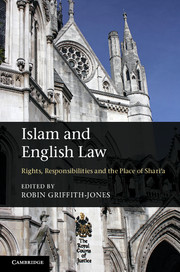Book contents
- Frontmatter
- Contents
- List of contributors
- List of abbreviations
- Preface
- Introduction
- Part I The Archbishop of Canterbury and shariʽa law
- Part II The Archbishop’s proposal for ‘transformative accommodation’
- Part III Responsibilities and rights
- Part IV Prospect: equality before God and before the law
- Select bibliography
- Index of cases
- Index
Part IV - Prospect: equality before God and before the law
Published online by Cambridge University Press: 05 April 2013
- Frontmatter
- Contents
- List of contributors
- List of abbreviations
- Preface
- Introduction
- Part I The Archbishop of Canterbury and shariʽa law
- Part II The Archbishop’s proposal for ‘transformative accommodation’
- Part III Responsibilities and rights
- Part IV Prospect: equality before God and before the law
- Select bibliography
- Index of cases
- Index
Summary
Prospect: equality before God and before the law
I want to press the distinction between ‘programmatic secularism’ and what some have called ‘procedural secularism’. It is the distinction between the empty public square of a merely instrumental liberalism, which allows maximal private licence, and a crowded and argumentative public square which acknowledges the authority of a legal mediator or broker whose job it is to balance and manage real difference. The empty public square of programmatic secularism implies in effect that the almost value-free atmosphere of public neutrality and the public invisibility of specific commitments is enough to provide sustainable moral energy for a properly self-critical society. But it is not at all self-evident that people can so readily detach their perspectives and policies in social or political discussion from fundamental convictions that are not allowed to be mentioned or manifested in public.
– From the Archbishop of Canterbury’s Lecture, ‘Secularism, Faith and Freedom’, in Rome, 23 November 2006.The rule of law is thus not the enshrining of priority for the universal/abstract dimension of social existence but the establishing of a space accessible to everyone in which it is possible to affirm and defend a commitment to human dignity as such, independent of membership in any specific human community or tradition, so that when specific communities or traditions are in danger of claiming finality for their own boundaries of practice and understanding, they are reminded that they have to come to terms with the actuality of human diversity – and that the only way of doing this is to acknowledge the category of ‘human dignity as such’, a non-negotiable assumption that each agent (with his or her historical and social affiliations) could be expected to have a voice in the shaping of some common project for the well-being and order of a human group … If the paradoxical idea which I have sketched is true – that universal law and universal right are a way of recognising what is least fathomable and controllable in the human subject – theology still waits for us around the corner of these debates, however hard our culture may try to keep it out. And, as you can imagine, I am not going to complain about that.
– From the Archbishop of Canterbury’s Lecture, ‘Civil and religious law in England’, in the Royal Courts of Justice, 7 February 2008.- Type
- Chapter
- Information
- Islam and English LawRights, Responsibilities and the Place of Shari'a, pp. 273 - 274Publisher: Cambridge University PressPrint publication year: 2013



